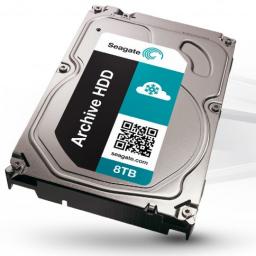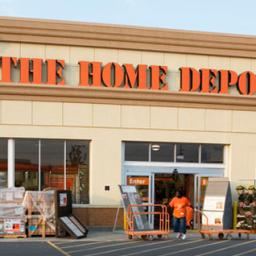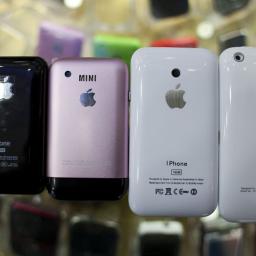
Seagate is pushing the boundaries on magnetic spinning media with a
new suite of 10TB hard drives - and is relaunching the familiar Barracuda brand name for the new product line. In 2013 the company unofficially retired the name, choosing instead to refer to its desktop drives as "Desktop HDD." Seagate is similarly rebranding its solid state-hybrid hard drives (SSHD) as FireCuda. These new launches come as the company is prepping for significant rounds of layoffs. Seagate has previously announced plans to fire roughly 8,100 people over the next 12 months, or 14% of its current global workforce. The company also plans to build 20 million fewer hard drives per quarter, down 33%.
These new 10TB drives don't appear to
use helium like other high-capacity drives, and they aren't based on
Shingled Magnetic Recording, either. These drives use more-conventional perpendicular recording, which means they won't take a performance hit when writing data, though still certainly no match for the solid-state competition. These also aren't the largest capacity hard drives available, either. If you've got the money to spend,
Samsung sells a 14TB SSD for upwards of $5,000.

Last July,
HEVC Advance announced onerous licensing terms which cast a shadow on HEVC/H.265 video compression technology. Encoder/decoder pricing of $0.80 to $1.50 per unit, with no minimum and no maximum cap, even backdated to the technology's first use! They also demanded a 0.5 percent royalty on HEVC-encoded content. Industry reaction to the proposed royalty was universally negative.
This seems the motivation for the big news in August, when a new consortium called the Alliance for Open Media announced that
it will begin work on a free video compression standard. The group includes tech giants Amazon, AMD, ARM, Cisco, Google, Intel, Microsoft, Mozilla, Netflix, Nvidia and more, while Apple is conspicuously absent. These large companies currently pay hundreds of millions in royalties for video patents and would greatly benefit from widespread adoption of a free and open standard.
Within the next six months Google expects to turn over its work on VP10 to the Alliance, which will blend Google's contributions with those from others to create a final royalty-free video codec standard. In addition, the Internet Engineering Task Force started development of a video codec standard called NetVC, of which VP10 is one candidate, so "some harmonization will be needed," between the two organizations.
With just one day remaining before tiny Tennessee-based electric co-op Duck River claimed it would rip Comcast's equipment and wiring off its utility poles for non-payment of pole attachment fees, Comcast showed up with a check. Had Comcast not come up with a payment, Duck River was prepared to start removing Comcast's wiring and equipment from its poles, and cut power to Comcast's equipment, which would have
killed service for about 7,000 Comcast customers.
Comcast claims Duck River is using their position as a monopoly to gouge customers with high rates. Duck River officials dispute that and say Comcast was behind (again) on its pole attachment fee payments and is the only utility company complaining about the price. "If you don't pay your Comcast cable TV or internet bill, they're going to do what?" The answer, said Steve Oden, director of member services at Duck River, is they "cut you off." The two are now talking (again) about securing a long-term contract that will stabilize pole attachment rates and keep Duck River's local power co-op from having to make collection calls in the future.

A U.S. Senate hearing last week examined billing practices for five major pay-TV companies serving some 71 million subscribers. Senators honed in on overcharges from Time Warner Cable and Charter Communications. Charter estimates it has annually overcharged 5,897 customers a total of $494,000 each year. "And rather than correct the mistake by refunding the overcharges,
the company just kept the money," said Sen Rob Portman.
Sen. Claire McCaskill commented: "We found that customers are being charged a host of fees that are not included in advertised pricing, some of which are for programming that used to be included in a customer's video package. We also found that, just as many customers have long believed, some of these fees, like the HD and DVR service fees, aren't a true reflection of the cost to the company of the service, but rather are based on the revenue goals of the company, and the price a customer is willing to stomach. In fact, some of these fees are charged to old customers while new customers get the same services free of charge."
"As a result of this investigation, both Time Warner Cable and Charter have taken steps to address these issues. Time Warner Cable will not, however, investigate when it began overcharging customers unless customers bring specific concerns to the company's attention, nor will it provide a full refund dating back to when the overcharge began."

Home Depot filed an antitrust lawsuit in federal court this week against credit card giants Visa and MasterCard for blocking the adoption of chip-and-PIN on credit card transactions. Instead, the companies adopted the less secure chip-and-signature method, which does not prevent lost and stolen cards from being used. Merchant groups, consumer advocacy groups and even the Federal Bureau of Investigation (FBI) called attention to the need to adopt chip-and-PIN in order to take full advantage of EMV security. According to data compiled by the U.S. Federal Reserve, transactions routed over Visa's or MasterCard's signature debit networks
cost retailers more than twice as much as transactions routed over PIN networks.
Home Depot's case against Visa and MasterCard is similar to one Walmart recently filed against Visa. In that case, Walmart says that Visa is precluding the retailer from requiring PINs on all debit card transactions. As a result, Walmart is forced to pay the fees associated with signature-based networks. For the world's largest retailer, that figure is in the billions.
Visa and MasterCard, along with groups such as the American Bankers Association, have said that requiring PINs with credit card transactions could cause confusion for consumers. Visa has also said that newer, better authentication technologies (such as biometric and geo-location verification) are just over the horizon.

Apple is one of the biggest targets when it comes to Chinese smartphone knockoffs - it's not uncommon to hear about a device being sold overseas that looks strikingly similar to the iPhone. So it came as a surprise on Friday when a battle between Apple and China over an iPhone patent entered the public eye, calling Apple a copycat manufacturer.
Chinese manufacturer Shenzhen Baili alleges the iPhone 6 and 6 Plus designs infringe upon its own 100C smartphone intellectual property, according to a Wall Street Journal report. The case is currently being reviewed by the Beijing IP Court. Apple has been copied so many times by Chinese manufacturers that it's hard to take Shenzhen Baili seriously. To hit home that point,
we've rounded up 6 of the best fake iPhones and other Apple products that have popped up in China.
The last audio cassette company in the country held on tight as its former competitors abandoned cassettes for CD production. Now that analog has begun to make a comeback, the National Audio Company, or NAC, owns its market and
is making more cassettes than ever before. When everyone jumped on the CD boat in the late 90s, NAC wasn't hurt because its customers were mostly spoken-word performers and people just buying blank media. So the company began slowly buying and rehabbing its competitors' equipment. "We were preparing ourselves to pick the music market up when it came back, and that's exactly what happened." Now NAC is making cassettes for Metallica, a special release of the Guardians of the Galaxy soundtrack, and what looks like countless basement recordings from smaller bands.
Banking so heavily on retro nostalgia is tricky, because what's retro and what's just old changes fairly often. Watch
the full video, from Bloomberg.

A radical new solution is being proposed to solve the housing crisis -
homes that float. Designers say homes that would rise with flood waters could be built on land otherwise deemed unsuitable because of flooding concerns. Each home can react to flood risk because the guide piles allow the building to rise in significant flood conditions, because of the buoyant basement structure. As flood waters recede the houses resettle to their original levels.
This is hardly the first attempt to develop land vulnerable to flooding. There are 20,000 fully-floating and can-float homes already built in the Netherlands.
Back in the mid-1870s, Sacramento, California
raised the level of its downtown by approximately 10 feet (3 meters) to eliminate devastating flooding. They built reinforced brick walls on downtown streets, and filled the resulting street walls with dirt. Building owners either raising their building slowly with the use of numerous screw jacks, or buried the ground floor. Thus the previous first floors of buildings became the basements.
Of course these solutions are no help if it is just the value of your house and mortgage that is "underwater".
A startup called HMD Global Oy (Helsinki, Finland) has been formed to takeover the Nokia brand for mobile phones and tablet computers and has said it intends to spend $500 million marketing Nokia as an Android-based mobile device over the next three years. HMD is owned by Smart Connect LP, a private equity fund managed by Jean-Francois Baril, a former Nokia executive, as well as by HMD management. As part of the same deal, Microsoft is selling remaining feature phone business assets to FIH Mobile Ltd., a subsidiary of Hon Hai Precision Industries (trading as Foxconn Technology Group).
HMD said it will produce smartphones and tablets that run the Android operating system. However while it is clear that HMD/Nokia will not be a manufacturers of mobile devices it remains unclear as to whether it will even perform its own design. The whole focus of the launch announcement was that HMD would focus on marketing and brand. It may yet also outsource the design of its devices and focus on putting its brand in front of consumers eyes and developing services that are accessed through those devices.
http://www.eetimes.com/document.asp?doc_id=1329712A generating tower at the world's largest solar energy plant was shut down Thursday after a mirror misalignment caused sunlight to burn through electrical wiring and start a small fire, according to officials. The blaze broke out around 9:30 a.m. Officials said that flames could be seen near the ninth floor of the Unit 3 tower, but that they had apparently died out by the time firefighters arrived.
The plant is located near Interstate 15, just inside the California border southwest of Primm, Nev. It uses enormous mirrors to reflect sunlight to boilers atop three towers. The sun's energy heats the water to more than 1,000 degrees, creating steam that spins electricity-generating turbines. Some misaligned mirrors instead focused sunlight on a different spot, which caused the electrical cables to catch fire. Only one of three towers is currently operating, with the fire shutting down one and another undergoing maintenance, Dusenbury said.
http://www.latimes.com/local/lanow/la-me-ln-solar-plant-fire-20160520-snap-story.html Seagate is pushing the boundaries on magnetic spinning media with a new suite of 10TB hard drives - and is relaunching the familiar Barracuda brand name for the new product line. In 2013 the company unofficially retired the name, choosing instead to refer to its desktop drives as "Desktop HDD." Seagate is similarly rebranding its solid state-hybrid hard drives (SSHD) as FireCuda. These new launches come as the company is prepping for significant rounds of layoffs. Seagate has previously announced plans to fire roughly 8,100 people over the next 12 months, or 14% of its current global workforce. The company also plans to build 20 million fewer hard drives per quarter, down 33%.
Seagate is pushing the boundaries on magnetic spinning media with a new suite of 10TB hard drives - and is relaunching the familiar Barracuda brand name for the new product line. In 2013 the company unofficially retired the name, choosing instead to refer to its desktop drives as "Desktop HDD." Seagate is similarly rebranding its solid state-hybrid hard drives (SSHD) as FireCuda. These new launches come as the company is prepping for significant rounds of layoffs. Seagate has previously announced plans to fire roughly 8,100 people over the next 12 months, or 14% of its current global workforce. The company also plans to build 20 million fewer hard drives per quarter, down 33%.



